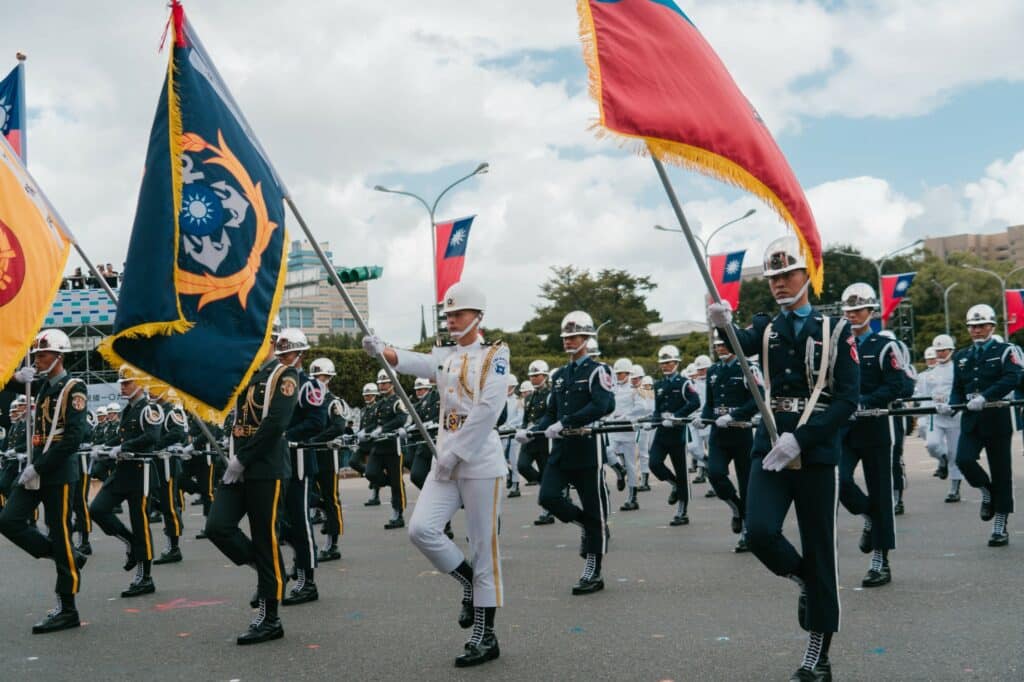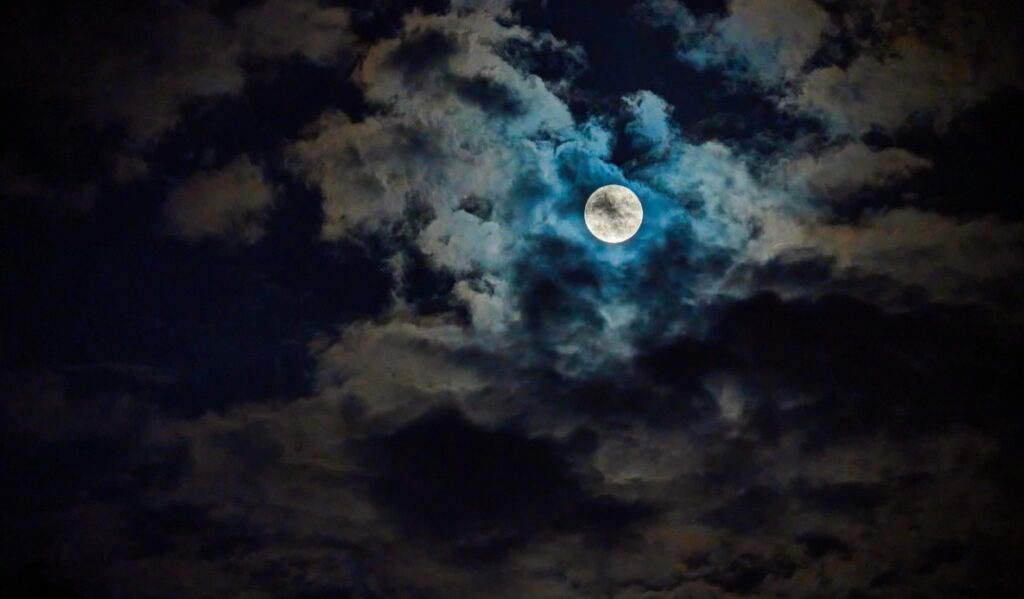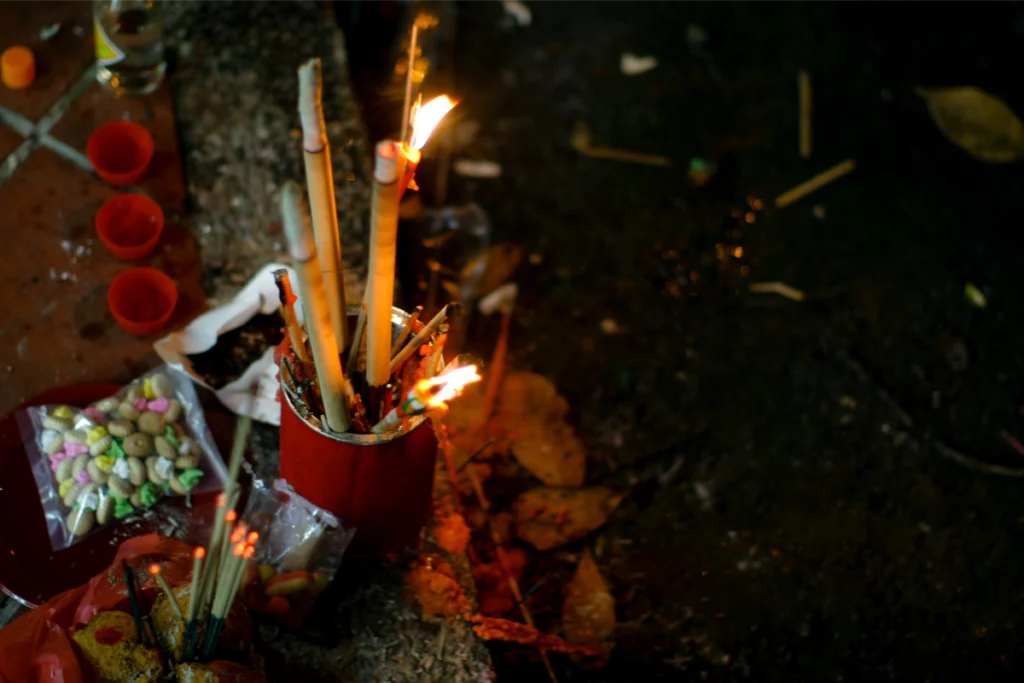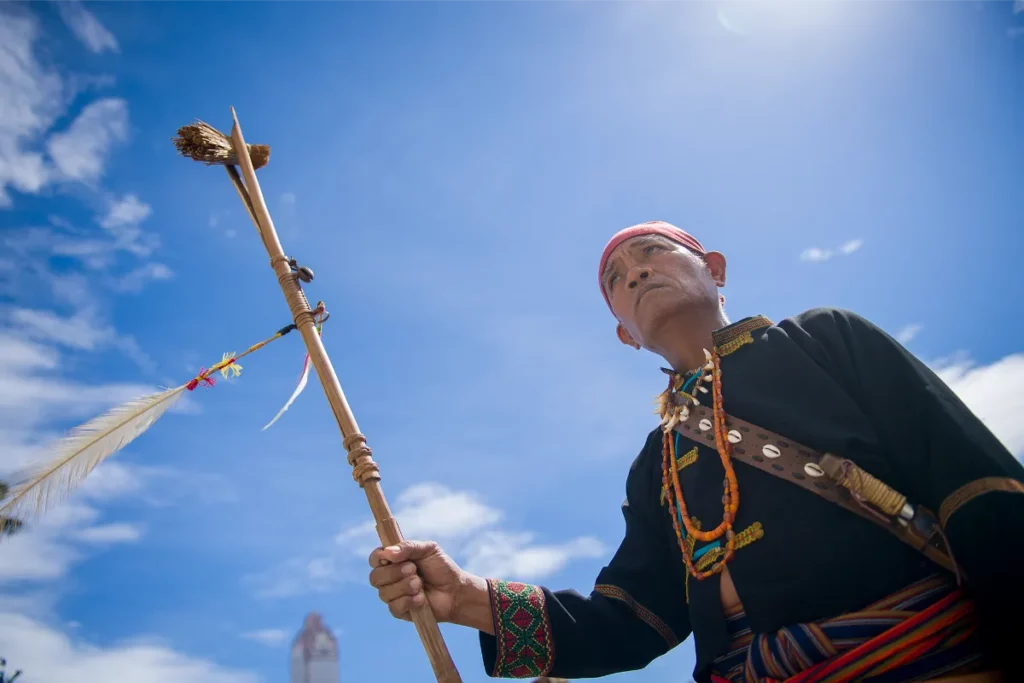Last Updated on 12-30-2023
A traditional festival with a lengthy history is the Hungry Ghost Festival. The Hungry Ghost Festival is celebrated every year in a number of locations around the middle of August. These celebrations include the Theatrical Presentations, Burning of joss paper, the releasing of water lanterns, etc., all of which are large-scale and have a joyous atmosphere.
The Origin of the Hungry Ghost Festival

The origin of the Hungry Ghost Festival is rooted in Chinese folk beliefs and religious practices. The festival has a combination of Buddhist and Taoist elements, along with influences from traditional Chinese ancestor worship and animistic beliefs. The primary purpose of the festival is to honor and appease the spirits of deceased ancestors and wandering ghosts, ensuring that they find comfort and relief during this period.
The origins of the festival can be traced back to several sources:
Buddhist Influence
The festival is thought to have been influenced by Buddhist teachings about karma and the cycle of birth and rebirth. In Buddhist beliefs, spirits may be trapped in a state of suffering due to negative karma from their past lives. The festival provides an opportunity for the living to offer food, prayers, and other offerings to help alleviate the suffering of these spirits.
Taoist Practices
Taoism also plays a significant role in the Hungry Ghost Festival. Taoist beliefs in the spirit world and the interaction between the living and the dead contribute to the customs of the festival. Taoist rituals and ceremonies are performed to seek protection from malevolent spirits and to honor deceased ancestors.
Ancestral Worship: Traditional Chinese culture places a strong emphasis on ancestor worship. During the festival, families pay homage to their deceased ancestors by offering food, incense, and other offerings at altars and gravesites. This practice is believed to strengthen the bond between the living and the dead and provide blessings for the living.
Wandering Spirits
The festival is also linked to the idea of wandering spirits who may not have living descendants to care for them. These “hungry ghosts” are believed to have no family to perform rituals for them, making them more likely to cause trouble or misfortune if not appeased. The festival aims to address their needs and provide them with offerings and prayers.
When is the Hungry Ghost Festival in 2023?

From August 16 to September 14, 2023, a veil of mystery descends as “The Ghost Month” unfolds—a significant period in the Chinese lunar calendar, nestled within the embrace of the seventh lunar month. Typically gracing the month of August in the Gregorian calendar, it is a time when cultural beliefs converge with a sense of reverence.This month, aptly known as the “Ghost Month,” carries an air of both intrigue and caution.
Ghost Month Open Day( August 16, 2023): All spirits leave the afterlife when the underworld’s gates open. While ghosts with masters go back to their residences, ghosts without masters wander the mortal realm aimlessly in search of food.
Ghost Month End Day (September 14, 2023): On this day, the gates of Hell once more close, sending the ghosts back to the afterlife.
You can also refer to our article to see more Taiwanese special festival.
The Traditional of the Hungry Ghost Festival

The Hungry Ghost Festival is rich in traditions and customs that vary based on regional practices, cultural interpretations, and religious influences. Here are some of the key traditions associated with the festival:
Offerings and Prayers
Families prepare altars or tables with gifts for their deceased ancestors, such as food, fruits, incense, and other goods. These offerings are intended to soothe and nourish the spirits. In addition, they burn joss paper, commonly known as “spirit money,” and other objects of symbolic meaning in the hope that their ancestors may gain from their transference to the spirit world.
Ghost Dinners
Extensive feasts called “ghost dinners” are planned in order to respect and pacify the ghosts. These celebrations involve a range of foods that are thought to be liked by the spirits and are frequently conducted in temples or outdoors. The table has empty places so that the ghosts may eat with us.
Burning of joss paper
As a sacrifice to the spirits, joss paper, which resembles money, is burned. It is thought that the smoke transports these offerings to the afterlife, where they bring solace and sustenance to the roving spirits and ancestors.
Theatrical Presentations
In some areas, puppet shows or traditional Chinese opera performances are put on as a kind of entertainment for both the living and the dead. The ghosts are thought to appreciate and welcome these performances as a sign of respect.
Water and Floating Lanterns
At the conclusion of the celebration, water and floating lanterns are discharged onto bodies of water to direct the souls back to the spirit world. This action represents the spirits’ safe departure and return to the afterlife.
Street Processions
In some areas, street processions are organized to honor the deities and spirits. These processions often feature elaborately decorated floats, performers, and worshippers dressed in traditional costumes.
Ancestor Worship
Beyond the specific practices of the Hungry Ghost Festival, ancestor worship is a significant aspect. Families pay respects to their ancestors by visiting gravesites, cleaning and maintaining the burial grounds, and offering prayers and offerings throughout the year.
Five Taboos of Hungry Ghost Festival

During the Hungry Ghost Festival, there are certain taboos or guidelines that people traditionally follow to avoid attracting negative energy or causing harm. These taboos are rooted in the belief that the spirit world is particularly active during this time, and it’s important to show respect and avoid actions that might disturb the spirits. Here are five common taboos associated with the Hungry Ghost Festival:
Avoid Going Out at Night
It’s believed that wandering spirits are more active during the nighttime, and going out after dark might increase the chance of encountering these spirits. To minimize the risk of encountering spirits, people often avoid unnecessary outdoor activities at night.
Avoid Swimming or Water Activities
It’s considered risky to engage in water-related activities during the seventh month of the lunar calendar. There’s a belief that water spirits are more potent and might try to drag people underwater during this time. This includes avoiding swimming, boating, or other water-based recreational activities.
Avoid Whistling or Calling Out Names: Making loud noises or whistling is believed to attract wandering spirits’ attention. It’s thought that calling out names may invite the spirits to attach themselves to the person calling. To avoid inadvertently summoning spirits, people refrain from making loud noises or using people’s names unnecessarily.
Avoid Disturbing or Stepping on Offerings
Families set up altars and offerings for their deceased ancestors and wandering spirits. It’s important not to disturb or disrespect these offerings, as it might upset the spirits or bring bad luck. This includes refraining from stepping on or walking over the offerings.
Avoid Red and Black Clothing
In Chinese culture, red and black are associated with funerals and mourning. During the Hungry Ghost Festival, people avoid wearing these colors to prevent drawing the attention of wandering spirits and to avoid offending the spirits that might be around.
It’s worth noting that these taboos might vary in different regions and among different communities. While some people strictly adhere to these guidelines, others might be more lenient in their observance. The taboos are rooted in cultural beliefs and practices that emphasize respect for the spirit world and maintaining harmony between the living and the deceased during this special time of the year.
Conclusion
In conclusion, the Hungry Ghost Festival stands as a captivating tapestry woven from the threads of ancient beliefs, cultural practices, and spiritual connections. As the gates to the spirit realm swing open, this poignant interlude casts a unique light on the delicate dance between the living and the departed. Rooted in a blend of Buddhist and Taoist influences, the festival carries within its rituals a deep reverence for ancestors and a compassionate acknowledgement of wandering spirits. With offerings, prayers, and performances, it bridges the chasm between realms, fostering a sense of harmony and remembrance. As each year’s festival unfolds, it offers a glimpse into a world where the mystical and the earthly unite, inviting us to honor the past, reflect on our place within the cosmos, and celebrate the profound mystery of life’s interconnectedness.








